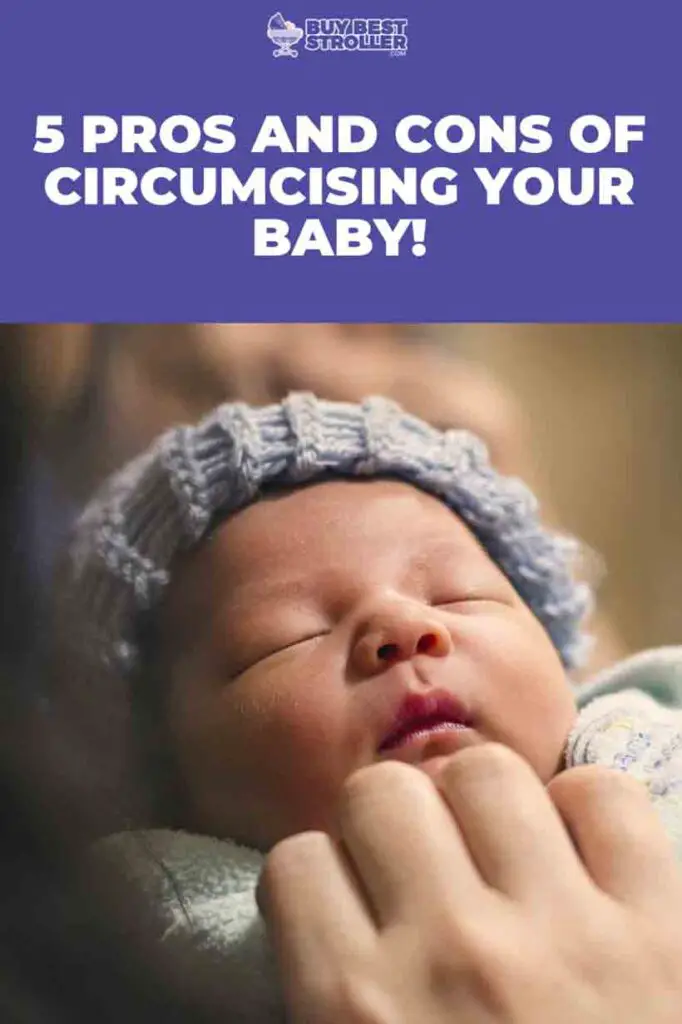You might be wondering what are the Pros and Cons of Circumcising Your baby and are concerned about whether or not to circumcise your baby.
Don’t worry I’m here to help you. In this article, I will give you an overview of circumcision and the pros and cons Of circumcising your baby.
As a new parent of a newborn, you have to make a lot of decisions that can be quite daunting and even a little scary.
Circumcision is a surgical procedure in which the foreskin (the skin covering the tip of the penis) is removed. Circumcision is not necessary.
However, if parents decide to do this for their infant, it is usually performed on the first or second day of their baby’s life.
According to recent estimates, it is more common in the United States and parts of Africa and the Middle East, and less common in Europe and some countries.
According to the 2012 American Academy of Paediatrics statement, circumcision has more benefits than risks.
Therefore, circumcision is a personal decision you must make with your partner after weighing the benefits and risks. Religion and culture may also play a role in your decision.
Different people have different perspectives on this matter. Some people regard it as a religion or cultural obligation, while others regard it as their own choice.
It is time to weigh the pros and cons of circumcising a baby. So, let’s begin!
Pros Of Circumcision Your Baby
According to studies, Circumcision has some health benefits. So, let’s look at what those benefits are.
- Less Risk Of Utis: According to the American Academy of Pediatrics, circumcised infants have a lower risk of developing urinary tract infections (UTIs) than uncircumcised baby boys.
- Decreases The Risk Of Penis Cancer: Circumcision may reduce the risk of penis cancer. It may provide some protection against penile cancer in newborns since it only occurs in the foreskin. In developed countries such as the United States, the risk of this cancer is very low.
- Reduced Rate Of Sexually Transmitted Diseases: Circumcision may decrease the rate of sexually transmitted diseases and reduce HIV.
- Reduced Risk Of Foreskin Complications: Since the foreskin is trimmed at the tip, there is a lower risk of complications. Prevention of phimosis is one example, which is a condition where it is difficult to retract the foreskin. Additionally, there is a lower risk of infection since urine and other germs don’t get trapped between the foreskin and glans.
- Easy To Keep The Penis Clean: It is also easier to keep the end of the penis clean after circumcision.
Read: Pros and Cons of Co-Sleeping
Also Read: 7 Pros and Cons of Baby Sleeping On Stomach
Cons Of Circumcision Your Baby
Circumcision does have some risks, just like any surgical procedure. However, problems after circumcision are very low. The most common problems are bleeding and infection in the circumcised area. Your doctor can treat both of these.
The following are some cons of circumcision:
- Infection: After surgery, infection is a common complication. There is a possibility that the surgical wound could get infected when pus and inflammation occur around the tip of the penis.
- Pain During Circumcision: The baby can experience some discomfort during circumcision. When your baby urinates, it may hurt. The pain usually disappears after 3 to 4 days. However, it may last for a week or two. Although your baby’s penis will probably begin to feel better after 3 or 4 days, it may look worse.
- Side Effects Of Anesthesia: When babies are circumcised under local anesthesia, they may suffer from breathing problems, irregular heartbeats, and allergic reactions. These side effects are rare and only occur when the baby has another medical issue.
- Excessive Bleeding: In very rare cases, Excessive bleeding may occur when a baby has a blood disorder.
- Damage To The Penis Or Foreskin: There is a risk of injury to the head of the penis if the procedure is not performed by a qualified doctor. Also, it increases the risk of trimming the foreskin unevenly, which could lead to complications later.
Final Thoughts
In this article, we have covered both the pros and cons of circumcising your baby. I hope you understand all the pros and cons before deciding whether to circumcise your baby.
Circumcision is a personal decision for every parent, and it’s often the first of many choices they’ll make for their child. Your doctor should be the first person you ask if you have any questions. If your baby has a medical condition, make sure you understand all your options before you make a decision.

FAQs
What Is The Right Age For Infant Circumcision?
Generally, a newborn boy gets circumcised in the first few days after birth, and at most one week after birth. Some babies may be delayed circumcised if they have a medical problem or if an immediate circumcision can affect their health.
How Should I Care For My Circumcised Baby?
When your baby boy is circumcised, you will have to care for his penis as it heals. It is important to clean the penis each time you change a diaper and apply petroleum jelly to the wound. You can apply jelly directly to the penis or apply it to the diaper in the area where it touches. Skin usually heals within 7 to 10 days. You may notice that the penis tip is red and there is some yellow fluid present. This usually indicates that the penis is healing.
How Long Does Circumcision Take To Heal?
Generally, a circumcised penis takes between seven and ten days to heal completely. When the foreskin is dry and healed, the Plastibell Technique plastic ring will fall off naturally in about a week. Sometimes complications may occur during or after the surgery.
Can I Give Baby Tylenol Before Circumcision?
Yes. About 30 minutes before the procedure, you can give the baby Tylenol (acetaminophen/paracetamol). As a precaution, it should only be given under medical supervision and in accordance with the doctor’s instructions. Don’t give your baby pain medication before the procedure if the doctor thinks it’s not necessary.
Can I Circumcise A Baby Boy At Home?
It’s possible. In cases of home birth, it is possible to get the procedure done at home, but only by a doctor and with the right equipment. It’s best to have the circumcision done in the hospital since there are more facilities, equipment, and better hygiene that can help to keep things as risk-free as possible.



